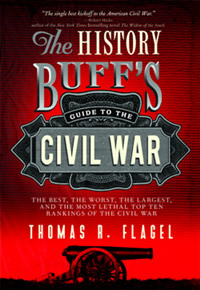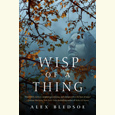Counting by Tens through the Civil War
Historian Thomas R. Flagel lists the best and worst of the War Between the States
From the Ten Commandments to David Letterman’s Top Ten list, people have almost compulsively ranked rules, movies, best-dressed people, and dumbest excuses into sets that can be counted off on ten fingers. But how do brief lists work when applied to the more complex world of human history, with its web of politics, regional allegiances, and subjective analyses? Apparently pretty well, if Thomas R. Flagel’s The History Buff’s Guide to the Civil War is any indication. Flagel, an instructor in the history department at Columbia State Community College, has developed a successful franchise in best-of lists, having applied the formula to not only the Civil War in general but also to the Battle of Gettysburg, World War II, and the American presidents. Now out in a revised, second edition, The History Buff’s Guide to the Civil War should find a home on the shelves of any reader wanting to gain greater understanding of this still-relevant conflict.
The lists Flagel presents are not simply numbered accumulations of names, events, and titles; they are solidly researched summaries of essential aspects of the war and its aftermath. And although some may include the amusing—the Top Ten Ways to be an Accurate Reenactor includes the advice “neglect your skin”—they are not concerned with mere trivia. In the opening list, Top Ten Causes of the Civil War, Flagel grabs hold of one of the war’s most emotionally charged issues and doesn’t let go until he cites words that still invite passion: “Pointing to the constitution’s preamble,” he writes, “many Northerners began to consider themselves as ‘We the People’ pitted against a South that appeared unwilling to ‘form a more perfect Union.’” Such words aren’t exactly fodder for late-night comedians.
 As in his exploration of the casus belli, Flagel is at his best when confronting the most difficult subjects. Who were the ten best commanding generals of the war? And, just as difficult, who were the ten worst? These kinds of lists are fraught with opinion-based determinants, but Flagel doesn’t seem to mind and backs his choices with sound reasons. After citing U.S. Grant’s many shortcomings, Flagel explains Grant’s placement at number four on the best-commander list (behind Stonewall Jackson, William Tecumseh Sherman, and Robert E. Lee) in part by noting, “[T]his unassuming man from Galena, Illinois, proved to be the only Federal commander willing to use the strongest weapon available to the Union: attrition.”
As in his exploration of the casus belli, Flagel is at his best when confronting the most difficult subjects. Who were the ten best commanding generals of the war? And, just as difficult, who were the ten worst? These kinds of lists are fraught with opinion-based determinants, but Flagel doesn’t seem to mind and backs his choices with sound reasons. After citing U.S. Grant’s many shortcomings, Flagel explains Grant’s placement at number four on the best-commander list (behind Stonewall Jackson, William Tecumseh Sherman, and Robert E. Lee) in part by noting, “[T]his unassuming man from Galena, Illinois, proved to be the only Federal commander willing to use the strongest weapon available to the Union: attrition.”
The History Buff’s Guide to the Civil War is a thought-provoking exploration of many aspects of a very complicated subject. As Flagel notes in his prologue, he intended the book to “furnish usable information and conversation fodder for aficionados.” He succeeded. As a history of a conflict that continues to spawn a veritable Mount Everest of literature, Flagel’s book cannot be considered the last word. But on the eve of the war’s sesquicentennial, it can be counted a sound and entertaining guide to a world not as distant as the years might suggest.
Thomas R. Flagel appears at Barnes & Noble Booksellers in Brentwood on September 10 at 7 p.m.


